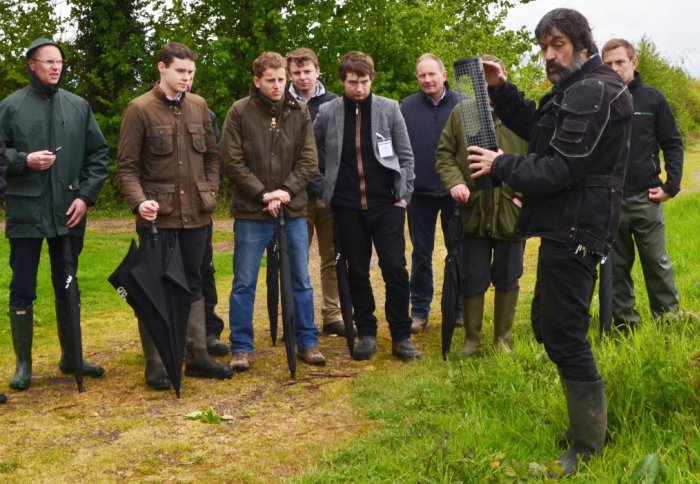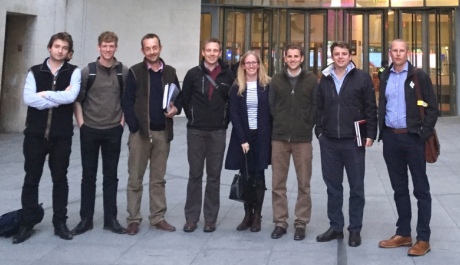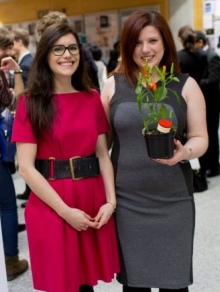Scholarship programme builds bridges between farmers and leading researchers

Farming scholars visit a research facility
Imperial and Sainsbury's have launched a scholarship to help farmers tackle challenges on the ground by partnering with academics and industry.
The year-long programme, which kicked off last month with a week of talks and activities, offers suppliers for Sainsbury’s the opportunity to collaborate with top UK scientists tackling challenges in the agricultural sector. This year, the programme will focus on issues in soil health and management to coincide with the UN International Year of Soils.

The farming scholars and organiser Laura Barter visit the BBC studios
For the rest of the year, they will choose a particular aspect of soil health and management to tackle on their farm, and partner with scientists and industry to come up with potential solutions. Hayley Dunning chatted to some of the farmers, scientists and people behind organising the programme to find out how the first week went.
Farmers
Seven farmers joined the scholarship programme this year, managing everything from vegetables and cereals to dairy cows. Cheshire dairy farmer and Sainsbury’s researcher John Brocklehurst says he joined the programme because soils are fundamental to what he does in agriculture. “Improving crop yields and quality starts by managing soil health,” he said.
“Getting the fundamentals from the experts during the launch week was great to understand how we can unlock the potential in our soils. The challenge now is to put the learnings into practice on farm, and I look forward to investigating my research topic.”
It really enforced for me the idea that the soil is not there to pillage and mine, but that looking after it helps soil life and also helps me.
– Adam Driver
Adam Driver works on his family’s farm in Suffolk growing crops including wheat, barley and beans. He says he came to the course because: “I wanted to understand how the different components of the complex soil system all work together so that I can improve yields while relying less on pesticides and artificial fertilisers and hopefully produce a better quality of product.”
Digging deeper into the scientific impact has helped him look at soil in a new way: “Soil is a living thing, and I learned that it’s important to maintain soil structure and improve the organic matter present to look after soil biology. Back on the farm, I want to put this into practise by increasing the diversity of our crops and cover.
“It really enforced for me the idea that the soil is not there to pillage and mine, but that looking after it helps soil life and also helps me. I’m looking at the next 20, 30 years: the long-term gain as well as the short-term benefit.”
Scientists
Throughout the week, the farmers received science lessons and hands-on demonstrations from the country’s top scientists researching both soil science as well as technology development. Dr Oscar Ces, from the Department of Chemistry at Imperial gave the scholars a first-hand look at technologies he’s developing to understand how chemicals used in agriculture are taken up by plants. Dr Jennifer le Blond, from the Department of Earth Science & Engineering at Imperial, took the farmers across to meet her colleague Dr Emma Humphreys-Williams at the Natural History Museum and get some hands-on experience analysing soil samples from their own farms.
They also met Kerry O’Donnelly and Angela de Manzanos, two PhD students at Imperial's Institute of Chemical Biology Centre for Doctoral Training who have come up with an innovative way to detect plant pathogens early, preventing the spread of crop disease. They invented FungiAlert, a device for identifying a pathogen’s spores in the soil before it infects the crop.
 “Phytophthora, a soil-borne plant pathogen, is responsible for loses of $5-7 billion per crop per year worldwide. Current detection protocols are too long, alerting farmers to the problem after infection, by which point the crops are untreatable. FungiAlert is an in situ, simple-to-use device that allows for the early detection of plant diseases in soil and water, yielding potentially billion dollar savings worldwide,” says O’Donnelly.
“Phytophthora, a soil-borne plant pathogen, is responsible for loses of $5-7 billion per crop per year worldwide. Current detection protocols are too long, alerting farmers to the problem after infection, by which point the crops are untreatable. FungiAlert is an in situ, simple-to-use device that allows for the early detection of plant diseases in soil and water, yielding potentially billion dollar savings worldwide,” says O’Donnelly.FungiAlert is just the kind of solution-based approach that could come out of the programme as the scholars target specific problems they face on their farms. The next phase of the programme is a creativity event in the summer bringing together the scholars, key academics, and industrial partners to brainstorm around the challenges each farmer wants to tackle.
It is for this reason that O’Donnelly and de Manzanos are so keen to be a part of the programme. “It is critical that new technologies are designed with the customer’s needs first, and so it will give us the opportunity for insightful feedback. It is fantastic that farmers are embracing new technologies and are open to innovation, and this program truly embraces this and allows for a partnership to grow between farmers, academia and industry.”
Organisers
The organisers of Imperial’s involvement in the scholarship are Drs Laura Barter and Rudiger Woscholski from the Department of Chemistry. The pair are the directors of AGRI-net, a BBSRC and EPSRC funded network set up to facilitate collaborations between leading physical science and agricultural science research communities in academia and industry with the aim of tackling global crop sustainability.
"Discussions between the scholarship farmers, academics and industrial partners have already begun to stimulate the genesis of wholly new ideas, which could lead to the development of next generation solutions in the field.”

All the participants of the week-long kick-off
Dr Woscholski agrees: "This programme brings together researchers and end-users, allowing both to inform each other about their interests and challenges. This is a unique opportunity for Farmers to interact and network with academics to learn about some of the advances in soil sciences and what opportunities these bring for their future practices on the farm."
Article text (excluding photos or graphics) © Imperial College London.
Photos and graphics subject to third party copyright used with permission or © Imperial College London.
Reporter
Hayley Dunning
Communications Division